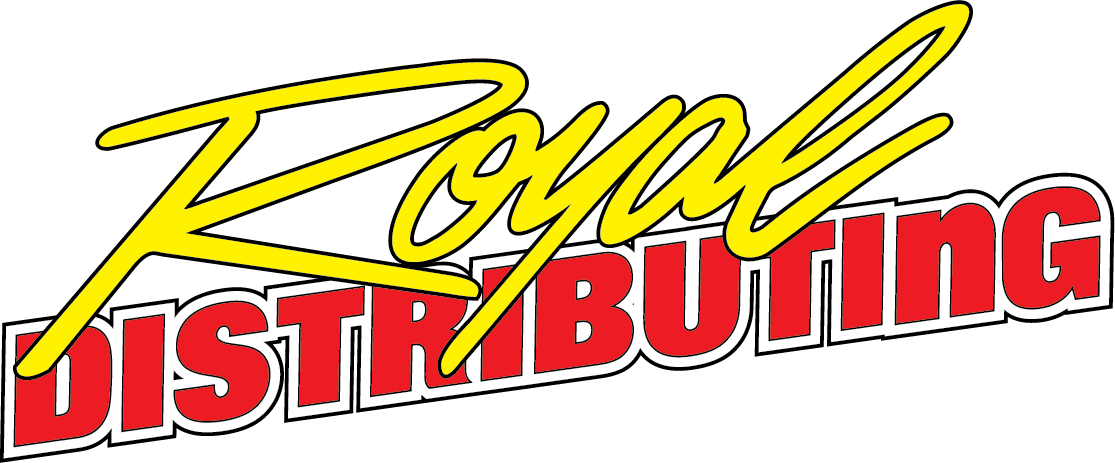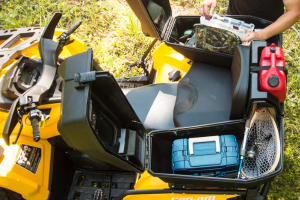AODA – Integrated Accessibility Standards Regulation (IASR) Customer Service Standards Policy
Multi-Year Accessibility Plan for Royal Distributing - Statement of Commitment
Royal Distributing is committed to treating all people in a way that allows them to maintain their dignity and independence. We believe in integration and equal opportunity. We are committed to meeting the needs of people with disabilities in a timely manner, and will do so by preventing and removing barriers to accessibility and meeting accessibility requirements under the Accessibility for Ontarians with Disabilities Act. (AODA)
Intent
- This policy is intended to meet the requirements of the customer service standards included in the Integrated Accessibility Standards Regulation under the Accessibility for Ontarians with Disabilities Act, 2005. It applies to the provision of goods and services to the public or other third parties, not to the goods themselves.
- All goods and services provided by Royal Distributing will follow the principles of dignity, independence, integration, and equal opportunity.
- This 2021-2026 accessibility plan outlines the policies and actions that Royal Distributing has put in place to improve opportunities for people with disabilities.
Definitions
Assistive device: A technical aid, communication device, or other instrument that is used to maintain or improve the functional abilities of people with disabilities. Personal assistive devices are typically devices that customers bring with them, such as a wheelchair, walker, or a personal oxygen tank, and that might assist in hearing, seeing, communicating, moving, breathing, remembering, or reading.
Disability: As defined by the Accessibility for Ontarians with Disabilities Act, 2005, and the Ontario Human Rights Code, refers to:
- Any degree of physical disability, infirmity, malformation, or disfigurement that is caused by bodily injury, birth defect, or illness and, without limiting the generality of the foregoing, includes diabetes mellitus, epilepsy, a brain injury, any degree of paralysis, amputation, lack of physical co-ordination, blindness or visual impediment, deafness or hearing impediment, muteness or speech impediment, or physical reliance on a guide dog or other animal or on a wheelchair or other remedial appliance or device;
- A condition of mental impairment or a developmental disability;
- A learning disability, or dysfunction in one or more of the processes involved in understanding or using symbols or spoken language;
- A mental disorder; or
- An injury or disability for which benefits were claimed or received under the insurance plan established under the Workplace Safety and Insurance Act, 1997.
Guide dog: A highly trained working dog that has been trained at one of the facilities listed in Ontario Regulation 58 under the Blind Persons' Rights Act, to provide mobility, safety, and increased independence for people who are blind.
Service animal: As reflected in Ontario Regulation 429/07, an animal is a service animal for a person with a disability if:
- The animal can be readily identified as one that is being used by the person for reasons relating to the person's disability, as a result of visual indicators such as the vest or harness worn by the animal; or
- The person provides documentation from a member of one of the following regulated health professional colleges confirming that the person requires the animal for reasons relating to the disability:
- College of Audiologists and Speech-Language Pathologists of Ontario;
- College of Chiropractors of Ontario;
- College of Nurses of Ontario;
- College of Occupational Therapists of Ontario;
- College of Optometrists of Ontario;
- College of Physicians and Surgeons of Ontario;
- College of Physiotherapists of Ontario;
- College of Psychologists of Ontario; or
- College of Registered Psychotherapists and Registered Mental Health Therapists of Ontario.
Support person: In relation to a person with a disability, another person who accompanies them in order to help with communication, mobility, personal care, medical needs, or access to goods and services.
Guidelines
The Provision of Goods and Services to Persons with Disabilities
Royal Distributing will make every reasonable effort to ensure that its policies, practices, and procedures are consistent with the principles of dignity, independence, integration, and equal opportunity by:
- Ensuring that all customers receive the same value and quality;
- Allowing customers with disabilities to do things in their own ways, at their own pace when accessing goods and services, as long as this does not present a health and safety risk;
- Using alternative methods when possible to ensure that customers with disabilities have access to the same services, in the same place and in a similar manner;
- Taking into account individual accommodation needs when providing goods and services; and
- Communicating in a manner that takes into account the customer's disability.
Design of Public Spaces
Royal Distributing will meet the Accessibility Standards for the Design of Public Spaces when building or making major modifications to public spaces. Public spaces can include, off street parking, ramps, sidewalks, entrances, check out lines and washrooms.
The Use of Assistive Devices
Customer's Own Assistive Devices
- Persons with disabilities may use their own assistive devices as required when accessing goods or services provided by the company.
- In cases where the assistive device presents a health and safety concern or where accessibility might be an issue, other reasonable measures will be used to ensure the access of goods and services, up to the point of undue hardship.
- For example, open flames and oxygen tanks cannot be near one another. Therefore, the accommodation of a customer with an oxygen tank might involve ensuring the customer is in a location that would be considered safe for both the customer and business.
- Alternatively, where elevators are not present and where a customer requires assistive devices for the purposes of mobility, service will be provided in a location that meets the needs of the customer.
Guide Dogs and Service Animals
A customer with a disability who is accompanied by a guide dog or service animal will be allowed access to premises that are open to the public unless otherwise excluded by law. "No pet" policies do not apply to guide dogs or service animals.
Staff may respectfully ask if an animal is a service animal and will not ask the nature of the person's disability or purpose of the animal.
Food Service Areas
A customer with a disability who is accompanied by guide dog or service animal will be allowed access to food service areas that are open to the public unless otherwise excluded by law.
Other types of service animals are only permitted into areas where food is served, sold, or offered for sale due to the Health Protection and Promotion Act, Ontario Regulation 493/17.
Exclusion Guidelines
If a customer's guide dog or service animal is excluded by law (see applicable laws below), Royal Distributing will offer alternative methods to enable the person with a disability to access goods and services, when possible.
For example, the company might accommodate a customer's disability by securing the animal in a safe location and offering the assistance of an employee to facilitate the delivery of goods and services.
Applicable Laws
Food Safety and Quality Act, 2001, Ontario Regulation 31/05: Animals not intended for slaughter or to be euthanized are not allowed in any area or room of a meat plant.
An exception is made for service dogs to allow them in those areas of a meat plant where food is served, sold, or offered for sale to customers. In those areas that do not contain animals or animal parts and are not used for the receiving, processing, packaging, labelling, shipping, handling, or storing of animals or parts of animals.
Dog Owners' Liability Act, 2005: If there is a conflict between a provision of this legislation or of a regulation under this or any other act relating to banned breeds (such as pit bulls) and a provision of a by-law passed by a municipality relating to these breeds.
The provision that is more restrictive in relation to controls or bans on these breeds prevails. Staff will respectfully explain that the service animal must be removed from the public area due to a municipal by-law and make alternate arrangements or provide the service outside the public area.
Recognizing a Guide Dog or Service Animal:
If it is not readily apparent that the animal is being used by the customer for reasons relating to their disability, Royal Distributing may request verification from the customer.
Care and Control of the Animal:
The customer who is accompanied by a guide dog or service animal is responsible for maintaining care and control of the animal at all times.
Allergies and Other Health and Safety Concerns
Balancing Competing Rights
If a health and safety concern presents itself, for example, in the form of a severe allergy to the animal, Royal Distributing will make all reasonable efforts to meet the needs of all individuals.
Pursuant to the company's obligations under the Human Rights Code and the Occupational Health and Safety Act, each customer's accommodation needs will be considered on a case-by-case basis, up to the point of undue hardship.
Mitigation and Accommodation Strategies
Due diligence needs to be paid to address health and safety requirements. For example, if a person's health and safety could be seriously affected by the presence of a service animal on the premises open to the public, management must fully analyse all options for safely accommodating the service animal.
Options could include creating distance between the two individuals to eliminate in-person contact, changing the time the two individuals receive service, or using air purifiers and other measures that could allow the person to use their service animal on the premises.
Removal and Behavioral Expectations
In very exceptional circumstances where a service animal becomes out of control, causing a clear disruption or a threat to the health and safety of others, and the animal's behaviour is not corrected by the owner, a person with a disability can be asked to remove their service animal from the premises.
Staff Assistance and Courtesies
As a courtesy, particularly if the person and service animal have been in attendance on the premises for a long time, staff may ask whether the animal requires water, may designate an area in which the service animal can relieve itself, or ask whether the staff can be of assistance pertaining to the service animal.
The Use of Support Persons
If a customer with a disability is accompanied by a support person, Royal Distributing will ensure that both persons may enter the premises together and that the customer is not prevented from having access to the support person.
There may be times where seating and availability prevent the customer and support person from sitting beside each other. In these situations, the company will make every reasonable attempt to resolve the issue.
In situations where confidential information might be discussed, consent will be obtained from the customer before any potentially confidential information is mentioned.
Admission Fees
Where the company requires a support person to accompany a person with a disability, and where the person with a disability has agreed to the accompaniment, the company will not charge the support person any fees or fares.
Notice of Disruptions in Service
Service disruptions may occur for reasons that may or may not be within the control or knowledge of Royal Distributing. In the event of any temporary disruptions to facilities or services that customers with disabilities rely on to access or use goods or services, reasonable efforts will be made to provide advance notice. In some circumstances, such as in the situation of unplanned temporary disruptions, advance notice may not be possible.
If a notification needs to be posted, the following information will be included unless it is not readily available or known:
- Goods or services that are disrupted or unavailable;
- Reason for the disruption;
- Anticipated duration; and
- A description of alternative services or options.
Notification Options
When disruptions occur, Royal Distributing will provide notice by:
- Posting notices in conspicuous places, including at the point of disruption, at the main entrance, and the nearest accessible entrance to the service disruption, or on the company website;
- Contacting customers with appointments;
- Verbally notifying customers when they are making an appointment; or
- By any other method that may be reasonable under the circumstances.
Accessible Emergency Information
Royal Distributing is committed to providing the customers and clients with publicly available emergency information in an accessible way upon request. We will also provide employees with disabilities with individualized emergency response information when necessary.
Customer Feedback
Royal Distributing shall provide customers with the opportunity to provide feedback on the service provided to customers with disabilities. Information about the feedback process will be readily available to all customers and notice of the process will be made available on the website or by contacting general reception. Feedback forms, along with alternate methods of providing feedback verbally (in person or by telephone) or written (handwritten, delivered, website, or e-mail), will be available upon request.
Submitting Feedback
Customers can submit feedback to:
Human Resources519-822-6903
925 Woodlawn Rd W, Guelph, ON N1K 1B7
hr@royaldistributing.com
Customers who wish to provide feedback by completing an onsite customer feedback form or verbally can do so to any Royal Distributing employee.
Customers who provide formal feedback will receive acknowledgement of their feedback, along with any resulting actions based on concerns or complaints that were submitted.
Training
Royal Distributing will provide training to all employees, on Ontario’s accessibility laws and on the Human Rights Code as it relates to people with disabilities.
Training will be provided in a way that best suits the duties of the employee.
Royal Distributing has added Accessibility Training to the orientation process to ensure that employees are provided with the training required that is needed to meet Ontario’s accessible laws for January 1, 2015. Training will be updated to meet new requirements on an ongoing basis.
Training will be provided to:
- Every employee of or a volunteer with Royal Distributing;
- Every person who participates in developing the policies of Royal Distributing; and
- Every other person who provides goods, services, or facilities on behalf of Royal Distributing.
Training Provisions
- Regardless of the format, training will cover the following:
- A review of the purpose of the Accessibility for Ontarians with Disabilities Act, 2005;
- A review of the requirements of the customer service standards;
- Instructions on how to interact and communicate with people with various types of disabilities;
- Instructions on how to interact with people with disabilities who:
- Use assistive devices;
- Require the assistance of a guide dog or other service animal; or
- Require the use of a support person (including the handling of admission fees);
- Instructions on how to use equipment or devices that are available at our premises or that we provide that may help people with disabilities;
- Instructions on what to do if a person with a disability is having difficulty accessing our services; and
- Policies, procedures, and practices of the company pertaining to providing accessible customer service to customers with disabilities.
Training Schedule
Royal Distributing will provide training as soon as practicable. Training will be provided to new employees, volunteers, agents, and contractors during the onboarding process. Revised training will be provided in the event of changes to legislation, procedures, policies, or practices.
Record of Training
Royal Distributing will keep a record of training that includes the dates training was provided and the number of employees who attended the training.
Employment
Recruitment and Hiring Process
Royal Distributing is committed to fair and accessible employment practices.
Royal Distributing will accommodate people with disabilities during the recruitment and assessment processes and when people are hired. Selected applicants will be accommodated on a per case basis to ensure that the job requirements will be successfully met and that all work performed includes the health and safety of the employee.
Individual Accommodation and Return-to-Work
Royal Distributing will develop or revise as required individual accommodation plans and return-to-work policies for employees that have been absent due to a disability. We will look at each case individually to make sure our employee is able to do their tasks.
We will take the steps to ensure the accessibility needs of employees with disabilities are taken into account if Royal Distributing starts using performance management, career development and redeployment processes.
Career Development and Performance Management
Royal Distributing will take steps to prevent and remove other accessibility barriers that may be identified by observing the barriers and develop action to be taken.
Kiosks
Royal Distributing at this time does not have Kiosks but will take the appropriate steps if they are ever implemented.
Information and communications
Royal Distributing is compliant with WCAG 2.0, Level AA and is committed to meeting the communication needs of people with disabilities. We will consult with people with disabilities to determine their information and communication needs.
The following steps will be taken to make sure all publicly available information is made accessible upon request, by looking at the information provided to the public and see where things could be difficult for someone with a disability to read, see or hear and ensure other formats are available in a timely manner.
Notice of Availability and Format of Documents to Customers
Royal Distributing shall notify customers that the documents related to the customer service standards are available upon request and in a format that takes into account the customer's disability. Notification will be given by posting the information in a conspicuous place owned and operated by Royal Distributing, the website of Royal Distributing, and any other reasonable method.
Administration
If you have any questions or concerns about this policy or its related procedures, please contact:
Human Resources519-822-6903 ext 2264 or ext 2232
925 Woodlawn Rd W, Guelph, ON N1K 1B7
hr@royaldistributing.com
This policy and its related procedures will be reviewed as required in the event of legislative changes or changes to company procedures.
Accessible formats of this document are available free upon request.





























































































































